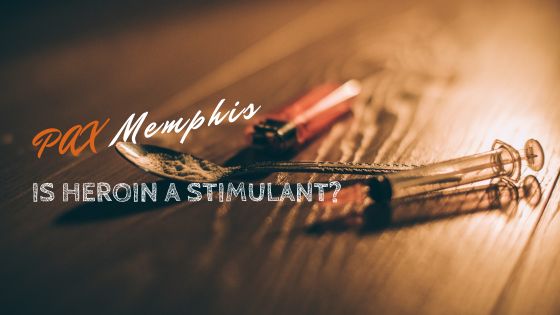Heroin is an illicit substance that belongs to the opioid class of drugs. Originally derived from the poppy plant, heroin can cause dependency and addiction after only a couple of uses. According to the National Institute of Drug Abuse (NIDA), about 1 million people reported abusing heroin in 2021.[1]
If you or a loved one abuse heroin, you might be wondering whether it is a stimulant or a depressant. Sometimes, people who have been abusing heroin for a long time feel energized after consuming the substance because their body is dependent on it. However, this does not mean that heroin is a stimulant drug.
Knowing the difference between the two main types of substances can help you understand why heroin is not considered a stimulant drug.
Understanding the Differences Between Stimulant and Depressant Drugs
Stimulant drugs are often referred to as “uppers” because they speed up messages between your brain and body to make you feel energized, awake, and alert.[2] Common stimulant drugs include Adderall, cocaine, methamphetamine, and ecstasy. Even the caffeine you consume in your morning coffee is considered a stimulant.
On the other hand, depressant drugs might be called “downers” because they slow down your heart rate, respiratory system, and even your gastrointestinal system.[3] As a result, people who abuse these substances feel relaxed, calm, and sleepy. Common types of depressant drugs include alcohol, opioids, benzodiazepines, and barbiturates.
The only similarity between stimulants and depressants is that both types of substances can produce rushes of euphoria. When you take a stimulant, you may feel extremely energized and have a heightened sense of happiness. Depressant drugs might cause a relaxed euphoric feeling that leads to drowsiness.
Is Heroin a Stimulant?
If you are wondering whether heroin is a stimulant, the short answer is no. Heroin is considered a depressant drug because it slows down messages between the brain and body in your central nervous system. This can result in effects like drowsiness, relaxation, a rush of euphoria, and slowed respiratory functioning.
In addition to being a depressant, heroin is also an opioid. While prescription opioids like oxycodone or hydrocodone are used to alleviate the symptoms of pain, heroin has no medicinal use because it has a high potential for abuse. As a result, heroin is only available for purchase on the street from drug dealers.
Because you can only find heroin on the street, there is no way to safely use it. Oftentimes, drug manufacturers mix dangerous substances into heroin like fentanyl to increase their profits and stretch out their product. This can increase the risk of a life-threatening overdose.
What are the Effects of Heroin?
People abuse heroin because of the rush of euphoria it causes when consumed. However, it can also cause adverse effects like vomiting, itchiness, and even life-threatening conditions like respiratory depression.
The common effects of heroin include:[4]
- A rush of euphoria
- Warm flushing of the skin
- Dry mouth
- A heavy feeling in the extremities
- Nausea and vomiting
- Severe itching
- Clouded mental functioning
- Slowed heart and breathing rate
Heroin abuse can lead to severe respiratory depression, many people who abuse the substance experience overdoses. According to the National Institute of Drug Abuse (NIDA), heroin was responsible for 9,173 overdose deaths in 2021.[5]
How to Tell if You Are Addicted to Heroin
When you abuse heroin, it can be difficult to determine whether you are addicted to the drug. This is because the substance requires the reward and pleasure system in your brain to make you think you need it to survive. Additionally, heroin use can limit your ability to think clearly, causing you to be in denial that you are struggling with a substance use disorder.
If you are wondering whether you are addicted to heroin, look out for the following signs of addiction:[6]
- Taking heroin in larger amounts or over a longer period than intended
- Experiencing uncontrollable urges or cravings to use heroin
- Desiring to quit using heroin and being unsuccessful
- Failing to meet responsibilities or obligations due to heroin use
- Continuing to use heroin despite experiencing social or interpersonal relationship issues
- Losing interest in previously enjoyed activities because of your heroin use
- Continuing to use heroin even though it is causing you to experience new or worsening physical or mental health issues
- Needing a higher dose of heroin to experience the desired effect (building a tolerance)
- Dealing with withdrawal symptoms when you cannot abuse heroin
If you struggle with the above-mentioned symptoms, it’s time to seek professional help. Long-term heroin addiction can lead to life-threatening overdoses, legal issues, and even severe physical health conditions that require medical treatment.
Finding Help for Heroin Abuse and Addiction
If you or a loved one suffers from heroin addiction, PAX Memphis is here to help. We understand how difficult it can be to recover from the effects of substance use disorders. Thankfully, we can connect you with a top-rated heroin rehab center in your area.
To learn more about how we can help you find a heroin addiction treatment center, contact PAX Memphis today.
References:
- The National Institute of Drug Abuse (NIDA): What is the scope of heroin use in the United States, Retrieved September 2023 From https://nida.nih.gov/publications/research-reports/heroin/scope-heroin-use-in-united-states
- The Alcohol and Drug Foundation (ADF): Stimulants, Retrieved September 2023 From https://adf.org.au/drug-facts/stimulants/
- The Alcohol and Drug Foundation (ADF): Depressants, Retrieved September 2023 From https://adf.org.au/drug-facts/depressants/#wheel
- The National Institute of Drug Abuse (NIDA): What are the immediate (short-term) effects of heroin use, Retrieved September 2023 From https://nida.nih.gov/publications/research-reports/heroin/what-are-immediate-short-term-effects-heroin-use
- The National Institute of Drug Abuse (NIDA): Drug Overdose Death Rates, Retrieved September 2023 From https://nida.nih.gov/research-topics/trends-statistics/overdose-death-rates
- The American Society of Addiction Medicine (ASAM): DSM-5 Criteria for Diagnosis of Opioid Use Disorder, Retrieved September 2023 From https://www.asam.org/docs/default-source/education-docs/dsm-5-dx-oud-8-28-2017.pdf
Medically Reviewed: September 25, 2019

All of the information on this page has been reviewed and verified by a certified addiction professional.










